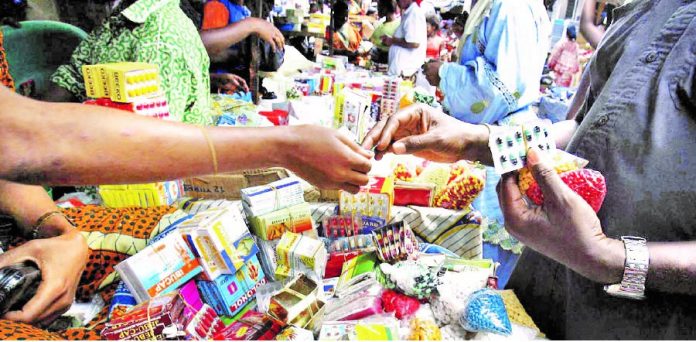BY ISMAIL ABDULAZIZ
MANY Nigerians have turned to alternative medicine to meet their health needs, driven by various factors such as perceived effectiveness, cultural beliefs, affordability, and accessibility.
For instance, Mrs Anne Aliyu, a mother of four, said her family resorted to alternative medicine after her husband lost his job.
According to her, the hospital they used to attend denied them treatment when they could no longer afford the bills.
“Our neighbour, who is a medical personnel, used to treat us and the children on loan. With the loss of my husband’s job in 2014, we couldn’t foot the bills again. The use of herbs and diets became an alternative,” she said.
She explained that her family now uses moringa and mango leaves, along with a variety of vegetables and spices in their meals, which she believes has helped reduce the frequency of seasonal illnesses.
Similarly, Malam Aliyu Madaki, a civil servant, shared his experience with alternative medicine when conventional treatments failed to improve his health condition.
“I attended a conventional hospital in Abuja for more than four years. From one prescription to the other, yet I was not healed. It was a friend who advised me to try alternative medicine.
“Now, with the use of medicinal products like Arabian black seed, olive oil, garlic, ginger and others, I am regaining strength and getting better by the day,” he said.
Albeit the growing popularity of traditional and alternative therapies, Nigeria’s broader healthcare financing remains a challenge.
The Abuja Declaration, signed in 2001, urged African Union (AU) member states to allocate at least 15 per cent of their national budgets to the health sector.
However, this target remains largely unmet by most countries. An AU report revealed that many African governments are falling short of their health financing commitments, including the Abuja Declaration benchmark. “While some countries like Rwanda, Botswana, and Cabo Verde have consistently met or exceeded the 15 per cent target, many others allocate significantly less, some as low as 5 to 7 per cent,” the report noted.
It further warned that chronic underfunding, combined with high out-of-pocket health expenditures by citizens, continues to hinder progress towards universal health coverage and effective healthcare delivery.
In addition, a UN Trade and Development report indicates that over 70 per cent of Africa’s medicines are imported, while most AU member countries lack domestic pharmaceutical production capacity.
“Pharmaceutical demand is rising rapidly across Africa, driven by population growth and evolving health needs. Some countries, such as Kenya and Ethiopia, are already attracting investment.
“Yet Africa captures only about 5 per cent of global greenfield foreign direct investment (FDI) in pharmaceutical manufacturing.
“The potential is clear. A study found that tablets, capsules and creams produced in Ethiopia and Nigeria could be 15 per cent cheaper than the same products imported from India”.
Alternative medicine, which involves treatments not typically part of standard medical care, offers a holistic approach to health.
It is often considered more affordable and culturally familiar, with fewer side effects and a focus on personalised care.
Moreover, it aligns with traditional beliefs and allows individuals to take a more active role in managing their well-being.
Stakeholders believe the future of alternative medicine in Nigeria holds great promise, especially with increasing recognition, integration efforts, and research into traditional and complementary therapies.
The country already has regulatory bodies in place to ensure quality control and efficient service delivery in the health sector.
For instance, the National Institute for Pharmaceutical Research and Development (NIPRD) is responsible for developing drugs, conducting quality assurance tests, and advancing research on locally made medicines.
Similarly, the National Agency for Food and Drug Administration and Control (NAFDAC) regulates and monitors products that affect public health, while the Pharmaceutical Council of Nigeria (PCN) oversees pharmacy practice and enforces professional standards.
The Medical and Dental Council of Nigeria (MDCN) supervises the training, licensing, and professional conduct of doctors and dentists to maintain quality in clinical care.
Meanwhile, the National Health Insurance Authority (NHIA), established in 2022, aims to expand universal health coverage through sustainable insurance models, reduce out-of-pocket health spending, and provide financial protection for Nigerians.
In the same vein, the National Primary Health Care Development Agency (NPHCDA) plays a key role in strengthening grassroots health delivery and promoting preventive care and community-based services.
Analysts argue that if these agencies can overcome challenges related to regulation, standardisation, and scientific validation, Nigeria could become a major player in both local and alternative pharmaceutical markets.
At the 2023 African Traditional Medicine Day, the then Minister of State for Health and Social Welfare, Dr Tunji Alausa, revealed that a significant percentage of Nigerians already rely on traditional medicine.
“Studies have shown that traditional medicine use in Nigeria is as high as 81.6 per cent, and this is not expected to decline, especially given the predicted rise in the global burden of diseases,” he said


